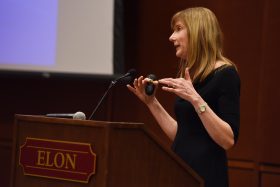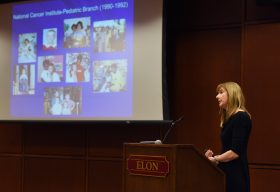Professor Cynthia “Cindy” Fair delivered Elon University’s 2016 Distinguished Scholar Award Lecture on Tuesday with stories of her research into the lives of young people born with HIV, and the challenges they face transitioning from pediatric care into adult health care settings.

She didn’t bring her medications. That would signal an illness.
The girl got pregnant. Their baby was HIV positive. The father still didn’t know his girlfriend’s diagnosis. He also doesn’t immediately know about the baby. Now there’s no hiding her condition. She needs to tell the father about the baby, too.
So went the story of one young woman interviewed by Elon University Professor Cynthia “Cindy” Fair, a national expert on transitioning from pediatric to adult medical care for children who were born with HIV. Fair, however, is not quick to bash the mother. Because at many points, the story “could have ended in a very different way.”
In a March 8 evening talk brimming with both hope and sadness, Fair delivered Elon University’s 2016 Distinguished Scholar Lecture to dozens of colleagues and students who heard stories about the history of HIV/AIDS and the challenges that remain for young people born with the disease.
The lecture is given annually by the recipient of the university’s Distinguished Scholar Award, which recognizes a faculty member whose research has earned peer commendation and respect, and who has made significant contributions to his or her field of study. Fair is the 16th recipient of the annual award.
“HIV is a defining feature of the late 20th and early 21st century,” Fair said in her LaRose Digital Theatre presentation. “There is still work to be done.”
About 10,000 people today live in the United States with perinatally acquired HIV, Fair said. That makes researching the transition from pediatric care to adult care all the more important. A transition can be daunting and, if not handled properly, is frequently associated with increased morbidity and mortality since patients stop taking medications.
Stopping treatments lead to other types of infections, Fair said, and HIV viral loads begin to increase. “They’re more likely to transmit the virus during sex, pregnancy and IV drug use,” Fair said. “We want to keep them engaged in care.”
Through multiple studies, Fair has interviewed patients, their parents and guardians, and their health care providers to better understand the tensions and fears inherent with treating the illness. Patients and caregivers often fear that disclosing their conditions will lead to stigmatization and social isolation.

Medical providers, meanwhile, often don’t ask patients about their life goals. Nor do they usually discuss with patients useful strategies for disclosing their conditions to other people, especially romantic partners. Advice typically boils down to “use condoms” and “don’t get pregnant.”
Fair acknowledged that parts of her research contain contradictions and she accepts those findings. “I would much rather recognize the complexity of life and avoid reducing people to stick figures and only innocent victims,” she said.
Adolescents with perinatally acquired HIV are people with aspirations, fears, sex drives, unique personalities, and friendships. And as many more of them live into adulthood, Fair said, doctors, parents and social service agencies need to do a better job of preparing them to navigate the world in ways that minimize the risk of rejection and stereotyping.
The girl who gave birth to an HIV-positive baby, who then needed to disclose her own condition to her boyfriend, could have had doctors that encouraged her to disclose her health history in a positive way. Her boyfriend could have asked that they get tested for sexually transmitted illnesses prior to having sex.
With the right resources and support, it would have been easy to “imagine a different story,” Fair said. “There are multiple opportunities for someone else to have stepped in and changed the outcome.”
Those opportunities are the focal point of her life’s work.
“The task before us is to identify how can we develop services that look at the whole person,” she said. “So rather than saying ‘don’t get somebody pregnant,’ ask, ‘do you want to have children?’ Begin with the question. Emphasize the importance of disclosure. I’m all for disclosure. But talk about the ‘how’ part.”
A former social worker at the National Institutes of Health, Fair worked with children with perinatally acquired HIV in the early 1990s, and she studies the experiences of adolescents who were not expected to survive into adulthood. Many of those children have long since died, Fair said, though a few have survived into adulthood and now face medical and social challenges linked to what is now considered a “chronic,” not terminal, condition.
As the drugs developed to treat HIV improved, the impact the disease had on families evolved and Fair’s extensive research reflects that. She has examined the stigma experienced by HIV-infected women and their uninfected family members as well as healthy HIV disclosure procedures.
Her research has resulted in dozens of papers and book chapters published in academic publications with presentations at national and international conferences. In addition, those interested in increasing their education or improving the quality of life of young people living with HIV have sought Fair’s expertise.
Pam Kiser, Elon’s Watts/Thompson Professor and Distinguished University Professor, introduced Fair on Tuesday with a recap of Fair’s professional and scholarly achievements.
Kiser also described how Fair involves her students in research. One of Fair’s most accomplished former students – Jamie Albright ‘13, who is pursuing a doctorate at the University of Virginia – even visited campus to watch her mentor’s lecture.
Also present were Fair’s husband and son, and both her parents, who would later present her with a large bouquet.
“If I were to say everything that needs to be said about Cindy, my remarks would end up being longer than hers,” Kiser said. “Her research matters in the lives of people who wrestle daily with complex medical and social challenges.”


